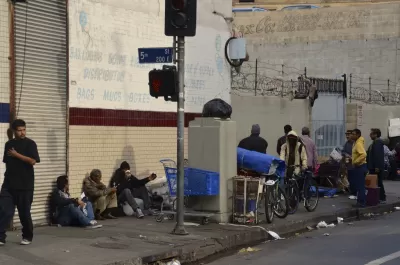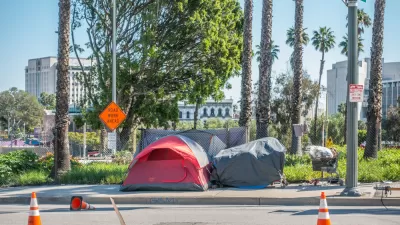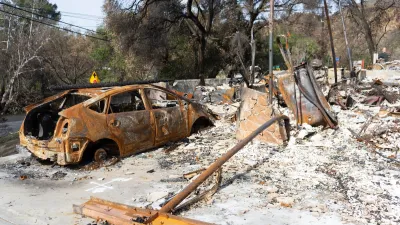City councilmembers express concern about progress of homelessness plan after receiving a first update report.

It's been nine months since the Los Angeles City Council unanimously approved a plan to address the city's homelessness issues and according to the first progress report from the city's administrator, Miguel Santana, realizing that plan is going to be difficult.
"Proposals for storage lockers and toilets for street dwellers are stalled, new shelter capacity is being added at a trickle, and the city bureaucracy moving more slowly than some council members had expected," reports Doug Smith of the Los Angeles Times. Councilmembers have expressed their exasperation with the slow movement of the project.
City officials do cite some successes: "The city received proposals from 49 developers to build permanent supportive housing on 12 city-owned parcels. Santana said a list of those selected will be announced next week," Smith tells us. There have also been updates to police training for interacting with homeless people with mental health issues and medical service people in the city's jails are now collecting homelessness, mental health and veteran status info. Also, the voters continue to show enthusiasm for homeless housing initiatives voting for measure NHH to authorize the city to create a bond measure to address the issue.
Sadly, none of this changes the fact that the physical improvements of adding beds and providing showers are moving slowly or not being provided at all.
FULL STORY: Report on L.A. city homelessness plan gives a sobering picture of the struggle ahead

Alabama: Trump Terminates Settlements for Black Communities Harmed By Raw Sewage
Trump deemed the landmark civil rights agreement “illegal DEI and environmental justice policy.”

Planetizen Federal Action Tracker
A weekly monitor of how Trump’s orders and actions are impacting planners and planning in America.

The 120 Year Old Tiny Home Villages That Sheltered San Francisco’s Earthquake Refugees
More than a century ago, San Francisco mobilized to house thousands of residents displaced by the 1906 earthquake. Could their strategy offer a model for the present?

In Both Crashes and Crime, Public Transportation is Far Safer than Driving
Contrary to popular assumptions, public transportation has far lower crash and crime rates than automobile travel. For safer communities, improve and encourage transit travel.

Report: Zoning Reforms Should Complement Nashville’s Ambitious Transit Plan
Without reform, restrictive zoning codes will limit the impact of the city’s planned transit expansion and could exclude some of the residents who depend on transit the most.

Judge Orders Release of Frozen IRA, IIJA Funding
The decision is a victory for environmental groups who charged that freezing funds for critical infrastructure and disaster response programs caused “real and irreparable harm” to communities.
Urban Design for Planners 1: Software Tools
This six-course series explores essential urban design concepts using open source software and equips planners with the tools they need to participate fully in the urban design process.
Planning for Universal Design
Learn the tools for implementing Universal Design in planning regulations.
Clanton & Associates, Inc.
Jessamine County Fiscal Court
Institute for Housing and Urban Development Studies (IHS)
City of Grandview
Harvard GSD Executive Education
Toledo-Lucas County Plan Commissions
Salt Lake City
NYU Wagner Graduate School of Public Service





























